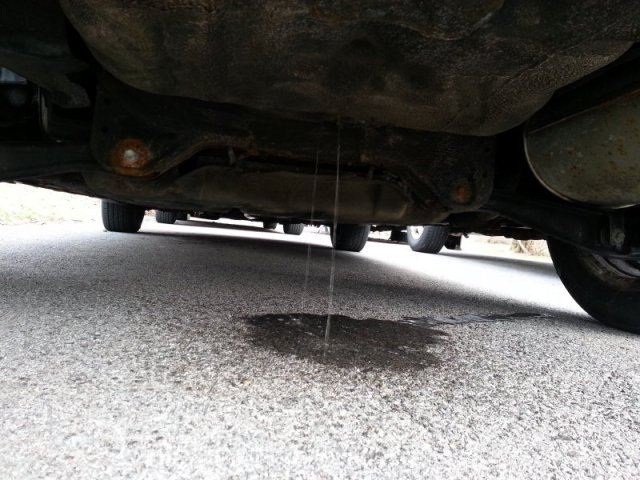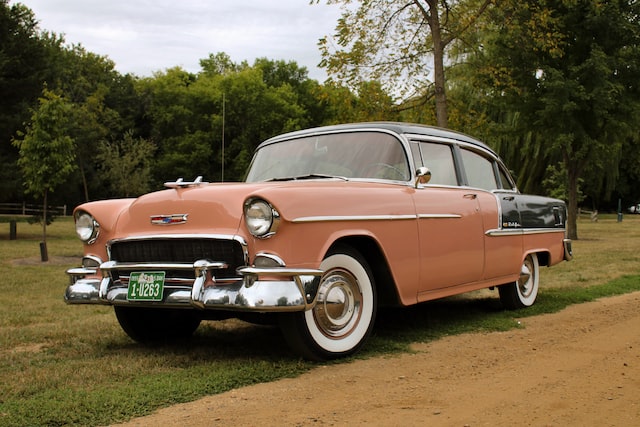Most of us have experienced some fluid leaking from car. While some of these leaks can be very simple and have almost no negative influence on the operation of your vehicle, others can be very serious and need immediate attention. So if you notice any fluid, If there is a leak under your vehicle, you must perform a visual inspection, identify the potential culprit, and act quickly.
As usual, the color of the liquid can indicate the source of the leak. Therefore, as a driver, you must educate yourself about the different types of liquid colors on your vehicle. This way, you don’t need to worry too much if the problem is not too serious. This article gives you a detailed list of the color of car fluids along with the power system in your vehicle. We also list potential causes of fluid leaks in each system.

How to identify Fluid Leaking From Car?
- Diesel
If you see a brown or black liquid leaking from the car, it’s engine oil. Initially, the engine oil looks very clear and golden when it is first poured into the crankcase. However, over a period of use, the temperature and pressure of the engine will change the color of the engine oil to light brown, dark brown, or black. In the case of new oil, the color will be lighter, not too dark, sometimes even cloudy because of dirt or other waste when flowing out.
Leaking oil is a sign that the rubber hoses or some parts are wearing out earlier than usual. More dangerous, this situation also entails a very high risk of fire and explosion. Besides, it can cause the car to suddenly stop working. If the vehicle is moving on the road and stops suddenly, the possibility of an accident is very high. Therefore, it can be seen that a leak of engine oil is a sign that the car is in danger. When encountering this situation, the driver needs to bring the vehicle to a service center as soon as possible.
In addition to recognizing that the leaked liquid is engine oil, car owners can detect this situation by looking at the oil dipstick on the car. If you observe that the oil drops more and more suddenly than the specified time, it is very likely that the car has an oil leak. On the other hand, the driver can observe when moving on the road, whether the exhaust pipe emits a lot of black smoke or not. If you see black smoke, that is a special symptom of a burning oil leak.
- Antifreezing water
One of the most common leaking car fluids is coolant. Coolant plays a role in reducing engine temperature for cars, if coolant leaks, the engine can overheat. More dangerously, this could be a sign of a water tank leak. When you see the blue, orange, yellow, or pink liquid coming out, it’s possible that the coolant is leaking. Vehicle owners should bring their vehicles to a service center for inspection.
- Power steering fluid
We mentioned above that engine coolant can be pink. In fact, seeing pink liquid coming out of your car is usually a telltale sign that your car has a transmission or power steering oil leak. Like engine oil, heat and time can cause this chemical to turn black or cloudy.
- Gear oil
Gear oil when leaking will be opaque pink or bright pink. This oil performs the basic tasks of lubricating, cleaning, and cooling the manual transmission. At the same time, it supports the hydraulic pump system to work efficiently. If a leaky transmission fluid leads to a lack of oil, the car is preparing to face a situation where the hydraulic pump system is not working properly. The pressure is low, not large enough to cause the friction centers to slip. The car becomes very weak, accelerates poorly even though the engine still increases rpm. This situation can cause the friction plates to slide a lot, leading to a fire, the car cannot jump gears. The most terrible consequence is a complete failure of the gearbox.
- Windshield wiper fluid
Windshield wiper liquid is one of the spilling fluids that does not influence the operation of your car at all. This spill will show up towards the front of your vehicle, is the consistency of water, and will frequently be brightly colored.
- Brake fluid
One of the most damaging fluid leaks is brake fluid. Leaking brake fluid is extremely dangerous because the vehicle’s entire braking system relies on hydraulic pressure to maintain the necessary braking force. Therefore, if the brake fluid is leaked, it can reduce the effectiveness of the brake system, putting the driver at risk in unexpected situations where urgent braking is required.
To identify a brake fluid leak, look at the area near the 4 wheels, along the body of the vehicle where the brake line runs. If you see a colorless or yellow-brown liquid, there is definitely a brake fluid leak in your vehicle. When this situation occurs, the vehicle owner should not drive the vehicle himself but should call a tow truck. Note that when checking, the brake fluid may be darker in color if the car owner has used it for a long time.
- Gasoline or water
Gasoline or water when leaked is colorless. If you see colorless water underneath your car, you can be sure it’s brake fluid, gasoline, or water. If the leaked liquid is simply water, car owners can rest assured because it is water from the air conditioner and is completely harmless.
On the contrary, if it is gasoline or brake fluid, the car is in danger of being caught on fire. Because when gasoline leaks, they evaporate into the air. If the vehicle is moving at hot temperatures, sparks may be encountered. This can very easily cause an explosion. The reasons why gasoline leaks are mainly because the injector’s sealing ring is faulty, the function is no longer guaranteed to cause gasoline to escape.
Read more >> How To Check Oil In Car? | The Step-By-Step Guide
The Reasons Behind Fluid Leaking From Car
- Condensation
Internal combustion engines, when in operation, produce hydrocarbons. This compound will be converted to more toxic byproducts through the catalytic converter. By-products include CO2 and water. As the vehicle’s temperature drops, condensation takes place in the exhaust system.
Then, when you start the car and warm up the engine, water droplets will appear in the exhaust. If the exhaust is leaking due to this reason, you do not need to worry because this is completely normal and there is nothing harmful to your car.
- Heated engine
Every time you start your car, it takes time for the car’s engine to get fuel to the moving parts before you can start driving. At that time, all the moving parts of the engine were very hot. As a result, a quantity of hot air is ejected through the exhaust system, resulting in the formation of water droplets in the exhaust manifold. If this happens, you have nothing to worry about because it will disappear when the coolant is introduced into the engine.
- Problematic engine parts
The piston helps the cam belts move each time fuel and air are ignited in the internal combustion engine. After the process of use, the piston will no longer be able to work as efficiently as before, causing fuel and air to not burn thoroughly. This will result in the engine drawing in coolant, causing the exhaust system to release water vapor in the form of white smoke. In addition, damaged cylinder heads, head gaskets, fuel filters, or clogged or cracked engines, can also produce white smoke from the exhaust.
Fluid leaking from car is not an uncommon case, however, if you do not understand the main cause as well as how to recognize it, you can face numerous dangers, including car damage or even an accident. We hope the above article has helped you somewhat in identifying liquids by color and location so that effective remedies can be taken.
If you want to get more information about DMV Test, visit our website and take our free DMV practice test to easily pass your exam, or download it for your IOS or Android devices now!

UT Utah License Renewal: A 2025 Comprehensive Guide
Discover the ultimate guide to Utah license renewal! This comprehensive guide delves into the intricacies of renewing your driver's license in Utah,...
February 13, 2023

South Carolina S.C. Driver's License Renewal
The South Carolina S.C. driver's license renewal process is designed to be comprehensive, taking into consideration eligibility requirements, renewal methods,...
February 13, 2023

Pennsylvania PA DMV License Renewal: A 2025 Full Guide
The Pennsylvania PA DMV license renewal process is designed to be comprehensive, taking into consideration eligibility requirements, renewal methods,...
February 10, 2023

